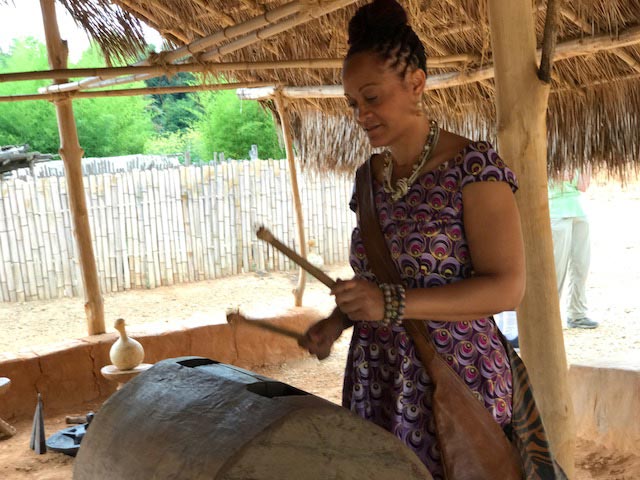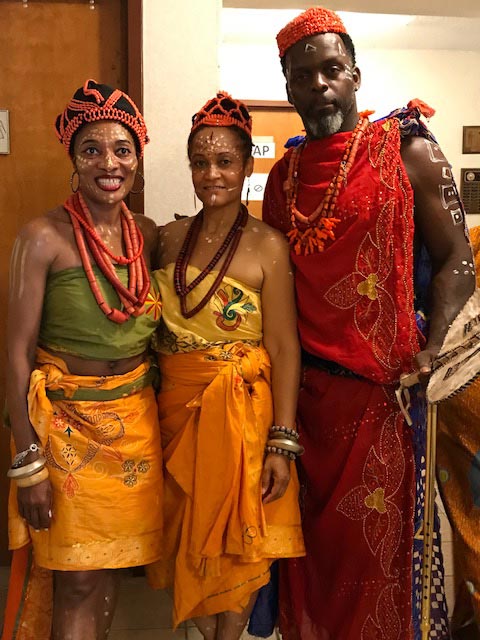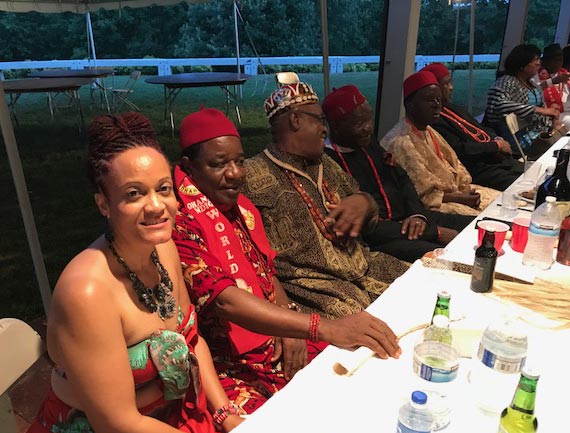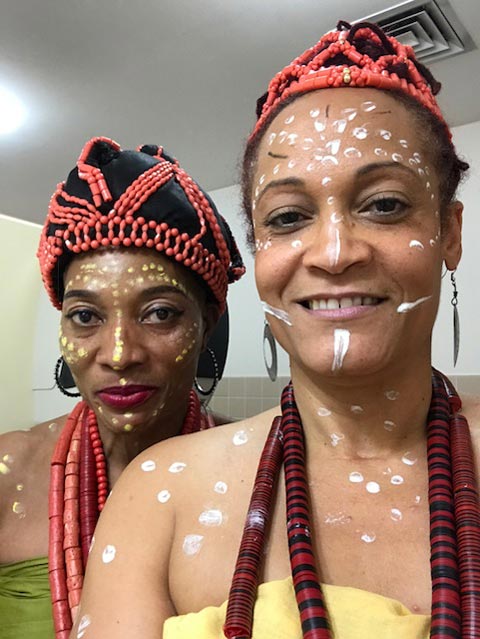
Denver Beaulieu-Hains plays the talking drum at the Igbo Village at in Staunton, Va. The Frontier Culture Museum has a complete traditional Igbo compound and Native American, Irish, English and German traditional home to highlight the founding cultural groups in the Shenandoah Region.
I am still Denver; but, I’ve also got a new name, Chisom, pronounced ‘Chee-some’. This name originates from Igboland in southeastern Nigeria. I was given this name recently by Chiedozie Alex Ogbonnia, an elder in the Igbo community. I’m not just accepting my African culture anymore. I’ve been given an identity and a seal of acceptance. You see, having a name makes me a part of the community. I’m not an outsider or outcast. I’m a member of a proud community and my name grants me a distinct value.
This means a lot. I see it as a rare opportunity that Africans and African-Americans collaborate. I’d like to see our communities interact more. This is just a start! My new name is based on the elder’s vision of me. He saw my pioneering and charismatic quality. He saw the “Chi,” the spiritual force that drives me and motivates me. It’s the essence in which I live and move, but even more, the Chi is the guardian spirit that leads, protects and commands one’s life in Igbo culture.
A Moment of Truth and an Opportunity
Chief Ogbonnia, my mom and I were among hundreds of people that attended the 2017 Igbo World Festival of Arts and Culture held annually in Staunton, Virginia. The festival brought us together; however, it took an impromptu conversation after the festival, punctuated by moments of reflection, followed by a mutual appreciation of the deeper connections we share as African-Americans and Africans – all of which ultimately led to the naming.
As we traveled via car from the festival we’d attended Ogbonnia heard how it felt to reconnect to our African roots and heritage, despite total ignorance. Likewise, my Mom and I shared our thoughts and asked questions about Igbo culture. Ogbonnia was detailed and frank, and provided appropriate explanations. It began:
“The countryside is beautiful here in America,” he said. “This is my best trip to the U.S., I get to see something besides the city.”
“Imagine what it was like working these fields as a slave,” I said.
There was thoughtful silence…
“The land would have looked very different then,” he replied.
Again, thoughtful silence…
“It was still hard work,” I said. “Someone cleared the trees from these fields.”
We laughed, but the truth is no one ever wants to talk about slavery, let alone, the misunderstanding and miscommunication between Africans and African-Americans. We did not share the same experience. Some were stolen from the continent. Others remained, perhaps wondering what happened to their loved ones. No one knows for sure.
However, I think we can stop focusing on the black-white issues to consider our African and African-American unified future. Sometimes I think we forget there is economic power in unity. I’m sure it was my thought that encouraged Ogbonia to name me Chisom. I believe working together, building economic power and support is a value and reality worth working towards.
Instead, I feel we often avoid the topic for fear of offending others. Ogbonnia had about six hours in the vehicle with me and my Mom. I’m sure it was an unforgettable ride.
“We were taught you all were savages,” my mother said. “I didn’t know you all could teach us anything.”
This admission came after she recognized many of her childhood teachings in the basic Igbo classes we had taken at the festival. The upbringing and basic values we learned of did not stray from those lessons provided by her mother and my grandmother. My mom is a descendant of the original settlers of Shenandoah. She is Igbo, German, Irish, English and Native American. However, she doesn’t look Igbo. She’s got green eyes, and pale complexion. When I tease her, I call her translucent. Further, she had no knowledge of African tradition, which is typical, similar to most Americans and African-Americans. During the festival, my Mom reconnected to more than her Igbo heritage. She witnessed first-hand and understood for the first time that her relatives lived in peace, intermingling and intermarrying with the other cultural groups in the midst of the Blue Ridge Mountains.
At the festival, Mom and I found connection and marveled at the Masquerade, a foreboding figure in African culture. It was during the Masquerade that she discovered the Igbo’s deep spiritual connection and beliefs about life and death. She watched in awe, wishing her parents could be there to witness the beauty and richness of their culture and custom.
My family had laughed at me for more than three years because of my afro-centric attitudes and activities. The Igbos had made her a believer. She found connection to her parents in the culture and customs exhibited at the World Igbo Festival.
What’s in a name?
Slavery in the U.S. has complicated the average African-American’s family tree; my tree is no different. My identity was confused in midst of blue-eyed and green eyed people. I’m 60 percent African, and 40 percent European. Slavery robbed black people of culture, custom, language and religion, and we lost our family names and the rich custom and culture found in Africa. It took me a long time to reconcile the idea that I had Caucasian cousin matches on my ancestry lists. It was also unforgivable that I realized I didn’t even know my true American surname. My father had been adopted when young, subsequently, he never had the name of his father. As if a cruel trick of fate, I became painfully aware of an identity crisis that left me in doubt of my worth and value. But, take it a step further, I also had friends and dated men in similar predicaments. We weren’t sure that the last name we carried was ours. I could easily find myself in a complex web of miss-identity.
African-Americans have been affected in our ability to connect to one another, love and share as a people and our male and female relationships have suffered. The forced separations, migrations and lack of self-love continue to plague our communities. Look at the rate of crime, divorce and our personification of beauty. Why can’t we all wear our own hair?
As Chisom, I have to ask the question.
Deeply rooted in spirituality and African custom, receiving a name feels a lot like being reborn. The Igbo Chi embedded into the name ‘Chi-som’ refers to the life force, which is exemplified and personified in me.
That being said, the Chi is interconnected and woven into the fabric of my personality. It’s who I am, my connection to the creator and my outward expression of self. It seems that I am, and become the qualities of the Chi, while demonstrating my essence through my gifts and activities. I’m also learning about Igbo culture and mindset. It is an honor and a privilege to be called Chisom. This helps my Igbo brothers and sisters recognize me because the name is like presenting a business card.
“Be imaginative of one who dares, and wins because his Chi is always with him/her,” Ogbonnia said. “Any definition of Chisom without the personal God component deprives it of its meaning.”
I’m Chisom, which means “God follows me.” I am a wonderfully, perfectly made, part of God.
Before meeting Ogbonnia, I’d decided I’d live life as if it were a prayer. I choose to be purposeful, and to make my connections meaningful and real. Since, I’m called Chisom. I think it all fits like a puzzle. The pieces are moving, maybe my Chi, the guardian, inspiration, and protector is using divine precision in the course. None-the-less, I seem to be on track.

Lilycent Igbani, Denver Beaulieu-Hains and David Countiss prepare to perform an Igbo dance during a funeral celebration. Beaulieu-Hains and Countiss are performing to learn more about the culture.
Denver Beaulieu-Hains is a writer, speaker and public relations professional with more than 20 years of experience working as a spokesperson, media consultant and planner for the Department of Defense and the federal government. She is a survivor of both sexual abuse and domestic violence. As a writer, she is thoughtful, honest and direct. At times the raw emotions of her experiences leap off the page. Beaulieu-Hains has a Master of Science in Administration with an emphasis on organizational development and leadership, and a Bachelor of Arts in Speech Communications and Journalism. Beaulieu-Hains is a native of the Washington D.C. metropolitan area and has three adult children.
Also by Denver
- Chance Meeting and Ethnic Shift: Awakening to my African-American Identity
- Healthy-living, Wellness and Dance Africa-style: Awakening to African-American Identity


